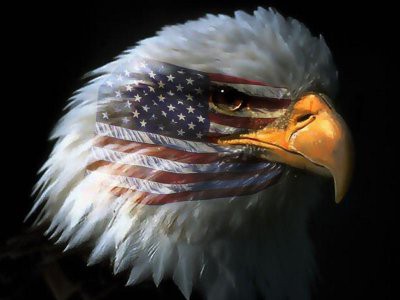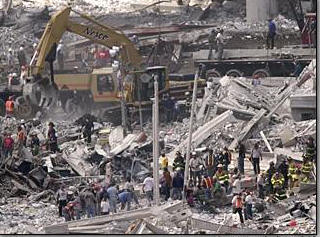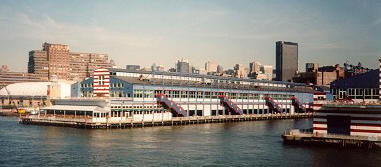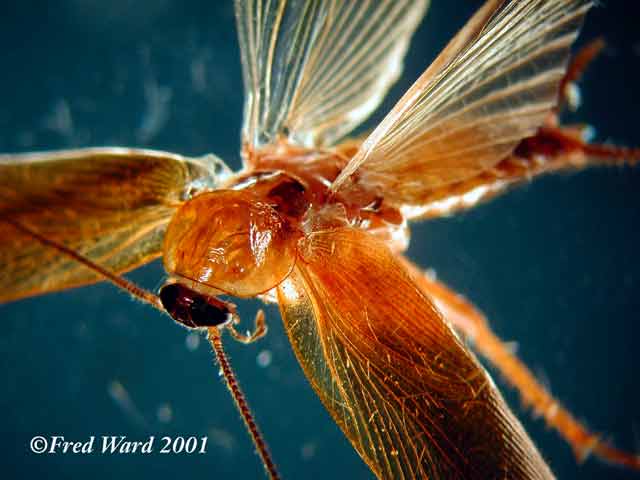 The
VigilanceVoice
The
VigilanceVoice

VigilanceVoice.com
Monday--
April 29, 2002—Ground
Zero Plus 230
One Woman's Choice To Face Terrorism
With Vigilance
by
Cliff McKenzie
Editor, New York City Combat Correspondent News
GROUND
ZERO, New York City, April 29--Each day my friend Emily
has to face the horrors of reliving the September 11th Terrorist
attack on the World Trade Center.
She's a high-tech
senior computer engineer and her company is responsible for
installing the destroyed computer networks at the heart of America's
financial district where the Terrorists attacked America's wallet
in hopes of crippling our stature as the world's financial power.
 Few know the destruction they caused. Cables, telephone
wiring, power supplies were ripped and ruptured deep in the
earth, splattering decades of work and installation of systems
and back-up systems, and back-ups of back-ups into gnarled,
twisted, broken memories of a well oiled electronic message
system--the main arteries of information that supports our massive
economy.
Few know the destruction they caused. Cables, telephone
wiring, power supplies were ripped and ruptured deep in the
earth, splattering decades of work and installation of systems
and back-up systems, and back-ups of back-ups into gnarled,
twisted, broken memories of a well oiled electronic message
system--the main arteries of information that supports our massive
economy.
Emily lost many friends
and coworkers that day, the Second Tuesday of September, 2001.
She also lost one of her closest friends--her older brother.
Immediately following the
disaster, she was called upon to institute repairs, and went
to the heart of her brother's graveyard, trying to ignore the
stench and horror of the rescue operations and subsequent clean-up
of the site. She tried to separate her professional
job of reconstructing the message systems and not let the daily
reminder of the horror cripple her emotionally as she tried
to shove the ugliness and waste of the attack, and the loss
of her older sibling and her friends from her mind.
But anyone who was there that
day, or was a victim of the fallout of the event, cannot shove
the memory of it from their mind. I can't.
I can still see faces of pained, horrified victims. I
can still see bodies leaping from the buildings. I can
still smell the death in the pall of the debris clouds that
showered upon us, and the Voices of those next to me crying:
"We're all going to die...we're all going to die."
Emily and I ran into one
another yesterday afternoon. I asked how she was
doing.
She has been suffering
heavily the post traumatic syndrome of losing her brother to
the senseless attack and also losing some of her friends.
Daily she faces the challenge when she returns to work
at the death-site where thousands died unexpectedly, and now
heavy equipment chews at the earth to reconstruct the destruction,
to reface it.
 She told me about a hallucination she had recently experienced,
or thought she had. Her brother loved sailing and kept
his boat at Chelsea Pier. She was driving north
along the West Side Highway to meet with a client about a new
computer system and when she glanced over at the docks where
her brother's boat was kept, she saw it. Or, at least
thought she did.
She told me about a hallucination she had recently experienced,
or thought she had. Her brother loved sailing and kept
his boat at Chelsea Pier. She was driving north
along the West Side Highway to meet with a client about a new
computer system and when she glanced over at the docks where
her brother's boat was kept, she saw it. Or, at least
thought she did.
She knew it was in
dry-dock, and thought the vision was her mind playing tricks,
creating reality out of illusion. She shook her head,
gripped the wheel of her car and told herself it wasn't possible,
yet was gnawed at by the reality of her vision--sure, but not
quite sure, the sloop she had seen was his.
Over the months
she related she would see the back of someone who resembled
her brother, and for a split second there would be a surge within
her of electric excitement that he was alive, only to have the
next nanosecond reveal that the figure wasn't he, but someone
who appeared like him.
She and her brother
met two to three times a week to talk and enjoy one another's
company. Accepting that he was gone was overpowering to
her, and that he had died a senseless death by the hands of
Terrorists, further ground her emotional well being down.
Emily, however tough
she might seem on the outside to shoulder the responsibilities
she assumed to help her sister-in-law walk through the maze
of her brother's death, was Jell-O inside. She was considering
quitting her job because she was the only top qualified expert
with vast experience who knew how to reconstruct the damage
at Ground Zero. No matter what the problem, her
company asked her input on its solution. There was
no escaping the need for her to be present at Ground Zero almost
daily, or to face the challenges of unraveling the destruction
with the new systems being installed.
Her fragility was exposed
recently when a bug flew into a conference room.
It buzzed her head and she recoiled. The other members
of the management team--knowing her loss and her pain--immediately
attacked the bug. Clumsily they all swatted and slapped
at it, smashing it finally in front of her.
She broke down.
It wasn't the bug that bothered her. It was the madness
of others trying to kill it, and the violence with which its
life was ended--hands swatting, slapping, crushing it.
She knew the bug was only a symbol of the pain roiling inside
her, the pain of grief and suffering, the pain of not being
able to forget the horrors of that day.
 As she told me the story of the bug, I listened intently.
A few days earlier I had seen a twisted steel girder on a truck
and it triggered in my mind that day nearly nine months ago
when I stood at Ground Zero watching the buildings collapse,
taking what I thought might be my last breath. I understood
what she was talking about.
As she told me the story of the bug, I listened intently.
A few days earlier I had seen a twisted steel girder on a truck
and it triggered in my mind that day nearly nine months ago
when I stood at Ground Zero watching the buildings collapse,
taking what I thought might be my last breath. I understood
what she was talking about.
Emily and I have a special bond
about that day. She was with me when I elected to
rush down to the site just after the first plane flew so low
overhead I could see the gleaming belly of the plane and knew
that something was wrong. She had given me a giant hug
and told me to be careful, to come back in one piece.
We had been sitting at Starbucks, having coffee.
Perhaps I symbolized the hug she didn't give her brother, who,
not far away, was rushing down to the site as I was to record
it for history.
As she talked, I thought I saw tears
welling in her eyes. She was fighting the urge to run
away from New York City, from the daily reminder of a tragedy
that cost so many their lives, and provided her with the turmoil
of a loving sister visiting her brother's grave each and every
day.
She told me she had decided to stay
and work. She had come to realize that no matter
where she went the memories of September 11 would not be left
behind. She was fighting to live with them.
She said her life would never be the same again, and had explained
that to her bosses--that she was far more fragile now than before--and
that she might break down on occasion as she had over the bug--and
if they could accept that, she would continue. But she
was no longer going to try hide her deepest emotions, or falsify
the pain she felt with bravado that only stuffed the pain.
Her bosses had agreed.
Few of her co-workers wanted anything to do with Ground Zero.
The pain for them was too great.
I thought about the Heroes of
Nine Eleven. There were countless of them.
But Emily had to rank at the top, or among the most Vigilant.
She didn't have to do what she did.
She could transfer her job as many others did, or cross over
to another field. There was no requirement for her
to put herself in emotional harm's way each day, to test the
limits of her psyche.
But she chose to continue her
work, even at her own emotional expense.
She was telling me she had resolved
the facade, that she wasn't going to "stuff" her emotions
any longer. She had joined World Trade Center Group,
others like herself who had suffered countless traumas and needed
to learn to express the pain so that it didn't drip like acid
on their souls until they found everything in their lives unbearable.
I thought about her Courage,
her Conviction and her Actions to face her Fears, her Intimidations,
her Complacencies. Even though her Voice trembled
at times, and the tears of sorrow swelled in her eyes, they
were cleansing emotions. I knew Emily wasn't the
kind of person to be afraid of anything. Or, to
find the easy way out of any challenging situation. That
probably made her the best at what she did, and was the reason
why her boss's gave her the toughest assignments.
But what I thought was powerful
about Emily's reconstruction of her emotional self was her facing
off of her fears, her addressing them eye-to-eye not only to
herself, but to the world around her unashamedly.
"I realize now, Cliff,"
she said, "I'll never be the same. I have to learn
to live with that. I thought maybe it would go away. But
I know it never will. I will have to deal with the pain
when it surfaces, and not feel guilty or ashamed when I break
down or cry, or become angry. I'll just have to accept
those feelings as part of me now, forever."
I gave Emily a big hug.
She had a strength about her, a maturity that only a survivor
of any disaster can understand. She had faced the
Terrorism within and come out with her own version of the Shield
of Vigilance.
 No longer was she trying to bury her pain. She realized
it would be with her the rest of her life, and she needed to
live with it, co-exist with its presence, but not in a Complacent
manner, but rather with a Vigilance, a concern for its marrow,
now part of her being.
No longer was she trying to bury her pain. She realized
it would be with her the rest of her life, and she needed to
live with it, co-exist with its presence, but not in a Complacent
manner, but rather with a Vigilance, a concern for its marrow,
now part of her being.
"I found out the boat was real,"
she said, cracking a smile. "I wasn't hallucinating.
My nephew had taken it from Oyster Bay over to Chelsea.
I called my sister-in-law after a day and a half and told her
I had this hallucination. She laughed and told me I wasn't
imagining things. It was my brother's boat. I was
glad. I thought I was going overboard there for a while."
We laughed lightly about it.
I was glad for her. I was glad she wasn't going to leave
the shadows of Terrorism, but had chosen to stand tall and face
them with the Light of Vigilance.

Go To April 28--Mirror, Mirror On
The Wall...Who's The Biggest Terrorist Of All


 Few know the destruction they caused. Cables, telephone
wiring, power supplies were ripped and ruptured deep in the
earth, splattering decades of work and installation of systems
and back-up systems, and back-ups of back-ups into gnarled,
twisted, broken memories of a well oiled electronic message
system--the main arteries of information that supports our massive
economy.
Few know the destruction they caused. Cables, telephone
wiring, power supplies were ripped and ruptured deep in the
earth, splattering decades of work and installation of systems
and back-up systems, and back-ups of back-ups into gnarled,
twisted, broken memories of a well oiled electronic message
system--the main arteries of information that supports our massive
economy. She told me about a hallucination she had recently experienced,
or thought she had. Her brother loved sailing and kept
his boat at Chelsea Pier. She was driving north
along the West Side Highway to meet with a client about a new
computer system and when she glanced over at the docks where
her brother's boat was kept, she saw it. Or, at least
thought she did.
She told me about a hallucination she had recently experienced,
or thought she had. Her brother loved sailing and kept
his boat at Chelsea Pier. She was driving north
along the West Side Highway to meet with a client about a new
computer system and when she glanced over at the docks where
her brother's boat was kept, she saw it. Or, at least
thought she did. As she told me the story of the bug, I listened intently.
A few days earlier I had seen a twisted steel girder on a truck
and it triggered in my mind that day nearly nine months ago
when I stood at Ground Zero watching the buildings collapse,
taking what I thought might be my last breath. I understood
what she was talking about.
As she told me the story of the bug, I listened intently.
A few days earlier I had seen a twisted steel girder on a truck
and it triggered in my mind that day nearly nine months ago
when I stood at Ground Zero watching the buildings collapse,
taking what I thought might be my last breath. I understood
what she was talking about. No longer was she trying to bury her pain. She realized
it would be with her the rest of her life, and she needed to
live with it, co-exist with its presence, but not in a Complacent
manner, but rather with a Vigilance, a concern for its marrow,
now part of her being.
No longer was she trying to bury her pain. She realized
it would be with her the rest of her life, and she needed to
live with it, co-exist with its presence, but not in a Complacent
manner, but rather with a Vigilance, a concern for its marrow,
now part of her being.
